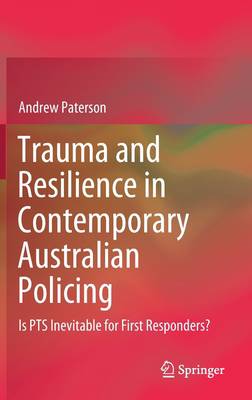
- Retrait gratuit dans votre magasin Club
- 7.000.000 titres dans notre catalogue
- Payer en toute sécurité
- Toujours un magasin près de chez vous
- Retrait gratuit dans votre magasin Club
- 7.000.0000 titres dans notre catalogue
- Payer en toute sécurité
- Toujours un magasin près de chez vous
Trauma and Resilience in Contemporary Australian Policing
Is Pts Inevitable for First Responders?
Andrew PatersonDescription
This book examines how fifty police officers in South Australia keep well and "bounce back" from duty-related traumatic experience in the absence of practical, accessible and timely organisational support. It investigates mechanisms police officers presently use to "normalise" their duty-related traumatic experiences to preserve the delicate professional balance between "coping" and "psychic numbing" and avoid the much publicised perils of a PTSD diagnosis, while being appropriately responsive to colleagues, victims and survivors in their daily work environment.
By revealing how police officers manage trauma--outside of the expectations of mental health professionals, union representatives and police leadership--innovative approaches and recommendations are offered to support first responders in moving from assumptions of post-traumatic stress and through post-traumatic growth. The book considers recent advances in post-traumatic growth and resilience theory and reinterpretsexposure in a positive context, as well as preventative experiences in Australia and internationally.
Spécifications
Parties prenantes
- Auteur(s) :
- Editeur:
Contenu
- Nombre de pages :
- 227
- Langue:
- Anglais
Caractéristiques
- EAN:
- 9789811644153
- Date de parution :
- 19-08-21
- Format:
- Livre relié
- Format numérique:
- Genaaid
- Dimensions :
- 156 mm x 234 mm
- Poids :
- 526 g

Les avis
Nous publions uniquement les avis qui respectent les conditions requises. Consultez nos conditions pour les avis.






